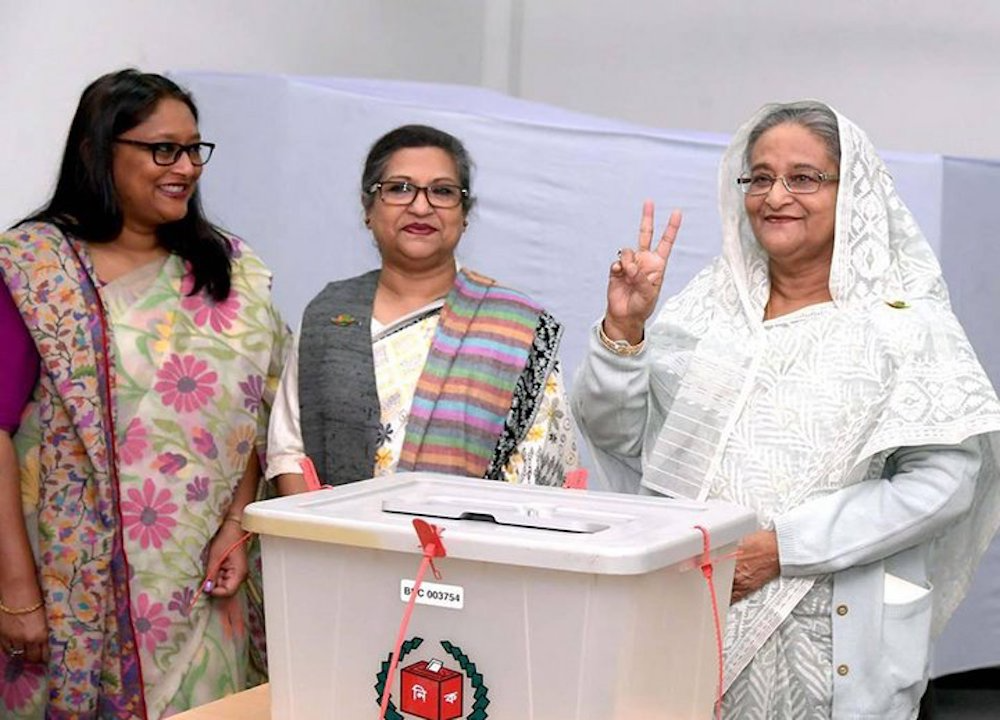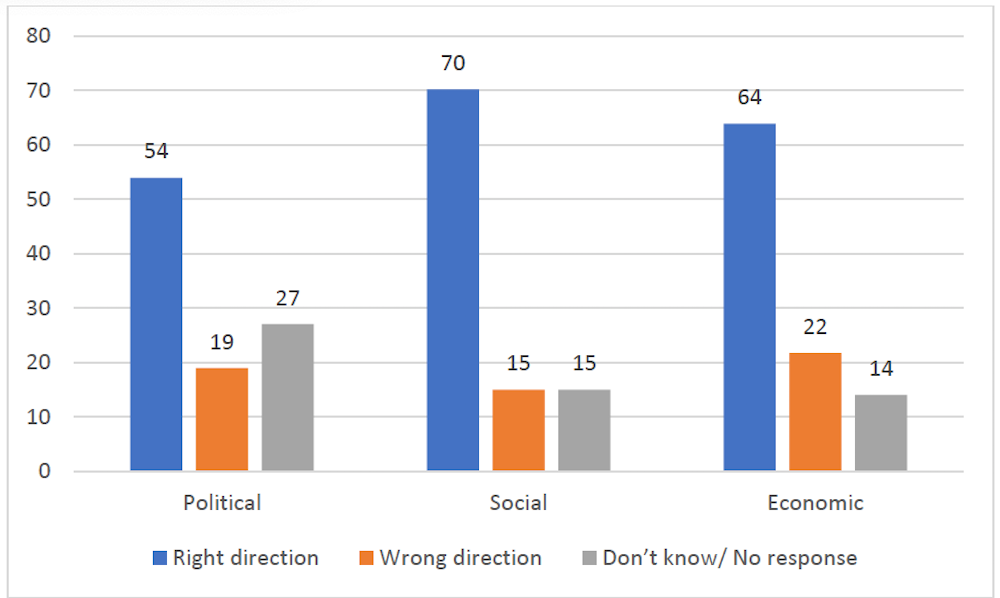The Awami League paradox
A new survey provides further evidence of popular support for the Awami League. So why does the party reject free and fair elections?

A paradox about current Bangladeshi politics involves how the Awami League government has turned its back on free and fair elections even though since 2014, polls and surveys have repeatedly shown that it continues to retain popular support — and this despite its increasing authoritarianism.
Many government critics will strongly question the premise of this paradox — rejecting the assumption that the Awami League government has majority popular support in the country, pointing for example to the (undeniable) widespread political repression, silencing of dissent, and corruption. These, they argue, make the Awami League less, not more, popular. Indeed, they argue, one needs no further evidence of the lack of support for the Awami League other than the party’s transparent unwillingness to hold free and fair elections.
However, independent surveys and polls repeatedly bear out the premise of majority Awami League popularity. And now there is yet another survey, this one undertaken by Brac University’s Institute for Governance and Development (BIGD) in its report “State of Governance in Bangladesh 2020–2021: Governing COVID-19 in Bangladesh – Realities and Reflections to Build Forward Better”, which confirms this.
BIGD found that 70% of the respondents in a 3,856 representative and randomised survey thought that Bangladesh was going in the right “social” direction, 64% in the right “economic” direction and 54% in the right “political” direction.

In relation specifically to the epidemic, the survey found that 90% thought that the government’s response to it was either effective (36%) or somewhat effective (54%).

82% also thought that the government’s response was “more effective than many other countries.”

Specifically, in relation to the government’s relief effort during the lockdown period, 65% thought that it “was more or less properly done.”
Though some findings of the survey were less supportive of the government — with about 40% of respondents thinking that the real numbers of Covid-19 cases and deaths were higher or much higher than the official numbers, and 54% of respondents believing that the “government conceals information” — these are nonetheless good numbers for the Awami League government.
“These findings suggest that the government of Bangladesh has enjoyed broad support and considerable public trust through the pandemic, including for how it has managed the crisis,” the report concludes from the survey.
Those who question the premise of government popularity also inevitably question the accuracy of these surveys — arguing that many of the people surveyed are too scared or wary to give honest answers to the questions — due to the possible repercussions of doing so. They could, for example, point in this survey to the relatively high 27% of people who responded “don’t know” to the question about the “political” direction in the country. Previous polls have shown a high percentage of “don’t knows” for other questions, suggesting hesitancy in answering truthfully.
While this is a legitimate concern, this is arguably an overblown claim in the context of people answering questions anonymously for a survey. If it was a real issue how would one explain that 54% of respondents were in fact willing to say that the government was “concealing information”, a pretty strong criticism of the government? If such a high percentage of respondents are willing to give that particular opinion, then one would expect them to be critical of the government in relation to other questions, if they actually did hold those critical views.
Government critics should perhaps not be surprised by Awami League’s popularity — going by the political economy analysis set out in the BIGD report. The report argues that since the Awami League is not seen widely as freely and fairly elected, it has to seek legitimacy from other sources — and the key source it has chosen to obtain this is through the promise of high economic growth. By achieving this, the report argues, “the regime [has been] able to enjoy a level of popular support that is entirely at odds with its record of suppression of democratic freedoms.”
In fact, the report argues that this issue was behind the government’s decision to end the Covid-19 lockdown going against scientific advice with case numbers increasing, rather than organising a properly funded national relief programme for the poor. “[The government] hoped,” the report noted, “to avoid any prolonged collapse of growth which was essential for preserving the regime’s unique and distinctive source of political legitimacy that rested on its reputation as the purveyor of robust growth. They […] needed to avert a growth collapse so that the primary source of the regime’s political legitimacy could be preserved.”
The report suggests that the support for the government over its management of the epidemic is closely linked to its decision to end the lockdown early.
Of course, there may well be other factors which help explain the surprising degree of general support for the Awami League, linked specifically to the authoritarian nature of the government. These include the control the party has over the media, the way it has repressed the opposition into irrelevance, and how — and this is a positive aspect of autocracy — its recent time in power has brought relative stability to ordinary people’s lives that not so long ago were riven by often violent party political disputes.
Despite the generally popular support found in the survey, the BGID report authors do identify many significant failures in the government’s Covid-19 response, stating that “the process of managing the Covid-19 disaster has been characterized by weak leadership and poor coordination, as well as cronyism and bureaucratic malfeasance” — an approach that it describes as “dysfunctional.”
Indeed, the commentary in the report is a notable example of how much dissonance there can be between expert critique on the one hand and popular opinion on the other.
As to the paradox set out in the opening paragraph, the reason why the Awami League has not allowed, and probably will not in the future allow, free and fair elections is that despite the political support they apparently now have, it simply does not want to face the risk of losing when the people are given a proper choice. If the media and opposition were unshackled, the Awami League feel uncertain about whether their support would hold. So do not bet on the government living up to its apparent recent commitment to the UK government to hold free and fair elections. Why risk losing?●
David Bergman (@TheDavidBergman) — a journalist based in Britain — is Editor, English of Netra News.